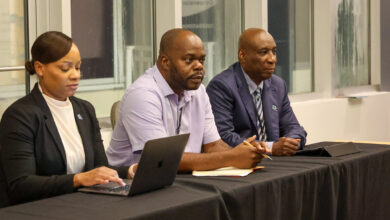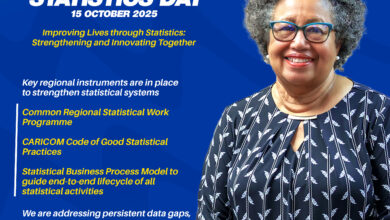Your Excellency, Dr. Rafael Alburquerque, VicePresident of the Dominican Republic,
Hon. Keremchend Raghoebarsing, Outgoing Chairman of CARIFORUM,
Hon. Knowlson Gift, Incoming Chairman of CARIFORUM,
Hon. Carlos Morales Troncoso, Minister of Foreign Affairs of the Dominican Republic,
Hon. Dr. Onfre Rojas, Minister of ONFED, The Dominican Republic,
Hon. Ministers, Members of the Diplomatic Corps, The Delegate of the European Union,
Distinguished Delegates,
Members of the Media,
Ladies and Gentlemen A warm welcome to you all – not only to this the 14th Meeting of Ministers of CARIFORUM, but given my long and intimate relations with this country I think I can take the liberty of joining in welcoming you to the Dominican Republic as well!
In making these opening remarks, I recall that the last occasion on which this sixteen-country CARIFORUM grouping met at Ministerial level in this country was in 2002. It was a very productive and enjoyable meeting. We hope for no less on this occasion.
Much has changed since, however, though a lot has remained the same. As regards the former let me first of all convey our warm congratulations to His Excellency Dr. Leonel Fernandez and his Government on his return to the leadership of his country. The Region looks forward to his unique contribution in its efforts to develop a society worthy of the highest aspirations of the Caribbean people.
In many ways, since we last met, the world itself has been in a process of continuous change. The global community, following the 9/11 disaster, has been experiencing increased levels of terrorism, most recently in Spain and the United Kingdom; has been involved in wars, mainly in Afghanistan and Iraq; and has seen increases in the incidence of HIV/AIDS and levels of poverty in the developing world. Record prices for petroleum products have also threatened global economic performance.
Perhaps, one of the few lights at the end of this long tunnel would appear to be the recent decision of the G8 on aid and debt relief for the HIPC countries. That gesture, has however not been extended to the Caribbean countries in general, although this Region has seven of the ten, and fourteen of the thirty most indebted countries in the world. Their sin is that they are considered middle, not low-income countries.
This is a serious situation as the Region’s trade prospects are virtually being cut off at the knees, as it were. This derives mainly from the changes in our trade relationship with our European Union partners. This relationship has been put under tremendous strain by virtue of a number negative changes imposed on our trade in Bananas, Sugar, Rum and Rice. These commodities, as we all know, are crucial to the economic well-being of the Region and these negative changes will therefore have significant and severe implications not only for our current economic condition but also for our future economic performance.
Our development finance cooperation with the European Union has also not been encouraging since our last Ministerial Meeting. We have made no significant progress in the programming of the resources available from the European Development Fund (EDF) to the Caribbean region. We are currently engaged in the Mid-Term Review of our Caribbean Regional Programme. This we expect, will reveal the causes of the lack of progress in programming and implementation, and hopefully will help determine what can be done to improve performance.
On the other hand as regards positive changes, in April 2004 with the European Commission, we launched negotiations for an Economic Partnership Agreement (EPA) which all parties agree must be a developmental tool. We will end Phase II of these negotiations in September. By then, we will know to what extent the European Union shares a common perspective and perception of what a developmental tool should be.
During the same period, we concluded a revision of our Cotonou Partnership Agreement with the European Union and agreed to Transitional Measures. By now we are all aware that the European Union was unable to finalise its long-term budget. Consequently, we have no clear indication of the financial value of the support the European Union is prepared to provide to the Caribbean in the next financial cycle under the Revised Cotonou Partnership Agreement. We remain hopeful, however.
The importance of the Region’s place in EU-ACP cooperation did however receive some reaffirmation, with visits to the Region this year by the new EU Commissioners for Trade and for Development Cooperation, Messers Peter Mandelson and Luis Michel, respectively, as well as by Director-General for AIDCO, Mr. Koos Richelle. We would need to strengthen these personal links as supplements to the institutional relationship.
Even more critical than all of the above is the relationship among ourselves in CARIFORUM. Our last Ministerial Meeting was in March 2004, in Suriname under the chairmanship of Minister Raghoeobarsing. On that occasion we took a number of important decisions. We have however not been able to meet before today to review those decisions, to verify their implementation and to determine our future course. Our CARIFORUM institutional structure has been under severe stress as a result of lack of financial resources. We virtually do not have technical staff and as Secretary-General of CARICOM, I have had to deploy CARICOM staff and resources to put in place at least a holding operation to ensure the continued servicing of the CARIFORUM function, and even to make possible the convening of this very meeting. We will need to leave here with some improvement of this situation.
Mr. Chairman, our agenda for this meeting is comprehensive. The very fact that we have not met for a long time has contributed to this situation. We will be reviewing the performance in respect of implementation of the 6th, 7th and 8th EDF regional projects and programmes and projects. We will be examining the draft of the Mid-Term Review Report on 9th EDF Programming. And, we will finalise those outstanding aspects relating to the future of CARIFORUM. We will also discuss aspects of our relationship with the European Union including the Economic Partnersip Agreement negotiations, the Implications of the Revised Cotonou Agreement, Trade in Commodities and our Development Finance Cooperation with the European Union.
In closing, Mr. Chairman, I wish to take the opportunity to extend our appreciation to the outgoing Chairman of CARIFORUM, Minister Raghoebarsing for his astute leadership over the last eighteen months. He has shown a strong commitment to CARIFORUM concerns, notwithstanding the demands he must have had to face as his country moved to national elections. Finally, it is with great pleasure that I welcome the new Chairman, Hon. Knowlson Gift, Minister of Foreign Affairs of Trinidad and Tobago. Minister, I wish you a most successful tenure and pledge the complete support of the Secretariat, one, which I expect, will be fully merged, fully staffed and fully resourced.
I thank you.





